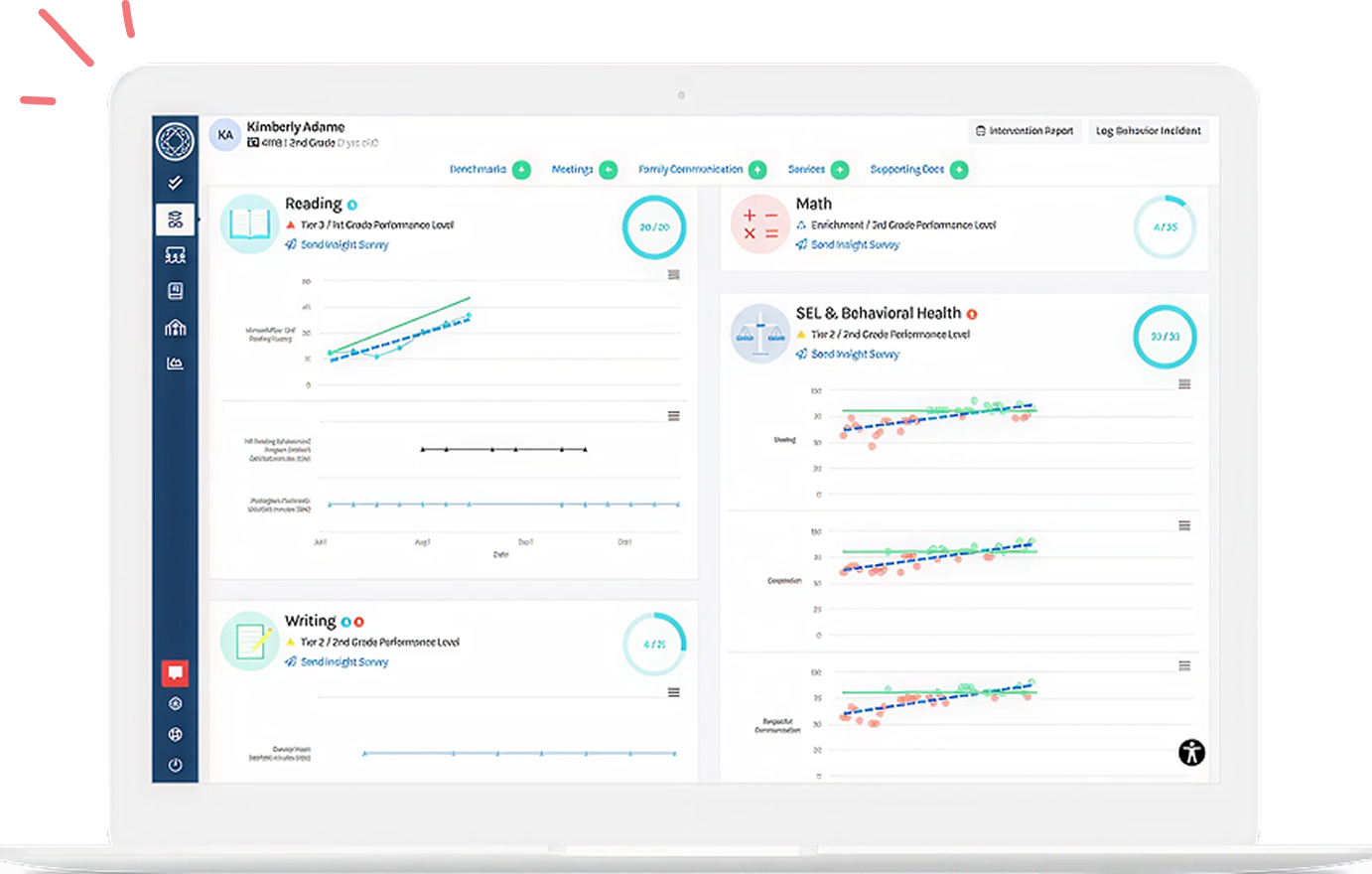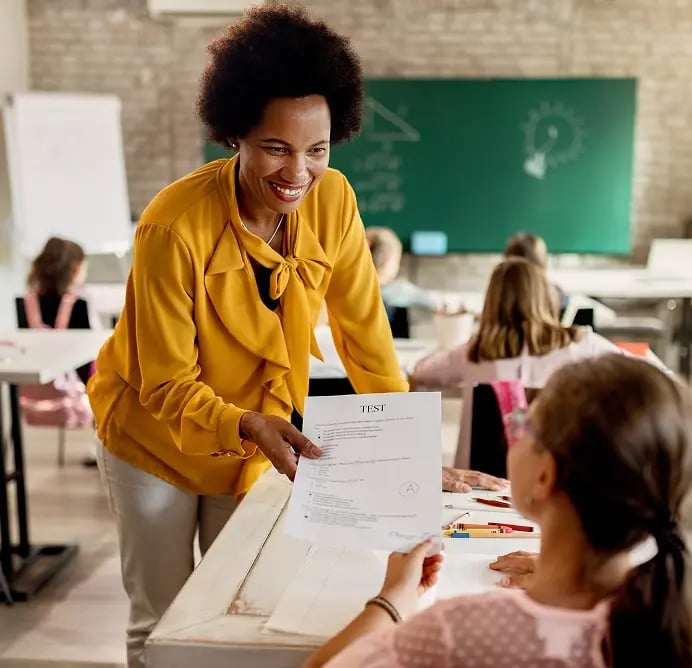The MTSS/RTI team is a school-based, problem-solving team; it is the engine that drives the MTSS/RTI practice. The MTSS/RTI team exists to proactively address system needs by reviewing school-wide data (within grade levels and classrooms) and support individual student growth by helping to monitor progress and make decisions for students at Tier 3.
The site administrator should play an active role in recruiting and ultimately designating the composition of the MTSS/RTI team. The most successful teams consist of volunteers, so it is important that site administrators make an effort to designate members who truly want to be involved. MTSS/RTI team membership is made up of both standing members who contribute expertise from their respective disciplines and those who may be invited to address a specific concern. Examples of standing members on the MTSS/RTI team include: administrator, general education teacher, school psychologist/counselor, dean, content area specialist, ELL teacher, special education teacher, and grade-level or department representatives.
-
How to Develop a Successful School Level MTSS/RTI Team?
Whether developing a team for the first time, filling open “positions,” or refining your current team dynamics, it is important to spend time reflecting on individual and group qualities that make for a success team. In order to do this, we must have a good understanding of what the team does, what individual characteristics help make the team successful, what skills the team members need to bring to the group, and what expectations can be established to help the team be successful, which we will cover below.
What Are the Responsibilities of the MTSS/RTI Team?
In a typical school, the MTSS/RTI team meets regularly with a structured agenda that varies throughout the month to:
- Review universal screening data;
- Review school-wide data, consider feedback and concerns from PLCs/grade or content teams, and make data-based decisions;
- Provide input on professional development as it relates to the school’s MTSS/RTI practice and Tier 1 needs;
- Provide input regarding school site intervention/enrichment schedule, curriculum, and/or course offerings;
- Support grade levels/departments in serving students during intervention blocks in collaboration with general education teachers;
- Discuss and communicate with the site administrator on issues relevant to the MTSS/RTI process;
- Consult and collaborate with administrators, counselors, teachers and parents about MTSS/RTI , problem-solving practice, and procedural integrity;
- Hold problem-solving meetings (that include parents) for individual students;
- Refer students for comprehensive special education evaluations when data indicate this step is warranted.
What Are the Characteristics of Effective MTSS/RTI Team Members?
MTSS is a system level practice, therefore, an MTSS team should consist of educators capable of leading system level change and management. According to the work of Chenoweth and Everhart (2002), effective leadership teams consists of individuals possessing the following characteristics:
- they are committed to school-wide change;
- they are respected by colleagues;
- they possess leadership potential;
- they demonstrate effective interpersonal skills; and
- they are self-starters with perseverance to see projects through
To promote a healthy school climate, the MTSS/RTI team, like any leadership team, should reflect the broader school community. In addition, the team members should each bring a unique set of skills and expertise to best fill out the responsibilities of different roles.
What Roles & Responsibilities Do MTSS/RTI Team Members Hold?
Successful teams clearly articulate everyone’s roles and responsibilities so people are adequately able to prepare for what is expected of them and bring their best to the team. The following are typical roles and responsibilities that should be explicitly assigned to members of the MTSS/RTI team, given individual strengths and abilities:
1) Administrative Representative- Provides leadership at MTSS/RTI team meetings
- Facilitates monitoring of instructional integrity within grade levels/departments
- Ensures progress monitoring for all students in Tiers 2 and 3 (both for students with IEPs and those without IEPs)
- Ensures school schedule and resource allocation enables a successful MTSS practice
- Celebrates and communicates success
2) MTSS/RTI Team Coordinator/Facilitator
- Coordinates and sets agenda for MTSS/RTI team meetings
- Provides expertise to MTSS/RTI team regarding problem-solving protocol
- Provides expertise in data analysis
- Identifies trends in student/staff need across school
3) Grade-level/Content Area Representative
- Serves as a liaison between PLC/grade-level/department team and MTSS/RTI team
- Attends grade level PLC/MTSS/RTI meetings on a regular basis
- Identifies trends in student/staff need across grade-level or content area
- Presents data/background information on student being discussed (in absence of classroom teacher)
4) Specialists (rotating members including ELL teacher, speech/language pathologist, intervention teacher, behavior specialist)
- Provides expertise to MTSS/RTI team regarding interventions and skill remediation
- Supports MTSS/RTI team with data interpretation and ensures linkage of data to selected interventions
- Gathers progress monitoring data from PLCs and Tier 3 interventionists for review during MTSS/RTI meetings
- Consults/collaborates with classroom teachers regarding differentiated instruction
5) Classroom teacher (Rotating member)
- Provides experience with and knowledge of student being discussed
- Presents data/background information on student
- Ensures next steps are documented and communicated with student and/or family
|
RELATED RESOURCES |
How Can a Team Be Set up for Success?
According to the Center for Collaborative Education, the following areas and questions should be considered:
- Logistics
- How often do we need to meet in order to do our work?
- Where and when will we meet?
- What equipment/tools do we use to facilitate our meetings?
- Timelines
- How long should our meetings be?
- Will we start on time or wait for any late team members?
- What is our plan for addressing tardiness and attendance of team members?
- Courtesy
- How will we show respect for each other?
- How will we encourage active listening?
- How will we encourage everyone’s participation?
- Decision-making
- What is our decision-making process?
- Is consensus needed for decision-making?
- How do we document and communicate our decisions?
- Workload assignment
- How can we ensure workload is distributed?
- How do we help each other balance our MTSS team work with other school responsibilities?
- Setting priorities
- How do we prioritize our workload?
- How will we make sure that tasks are completed on time?
- Enforcement of norms
- How do we hold ourselves accountable to these norms?
- What is our plan if norms are not followed?
In addition to clearly communicating individual roles and responsibilities, healthy and successful teams have a shared understanding of how they are expected to function as a group. While some groups develop these expectations or understandings organically, it should not be assumed that everyone is aligned. Clearly articulating expectations, or operational norms, will help promote a healthier team dynamic.
--
References:
Chenoweth, T. G., & Everhart, R. B. (2002). Navigating comprehensive school change: A guide for the perplexed. Larchmont, NY: Eye on Education.
Let us help you build the right team!Branching Minds offers a variety of professional learning opportunities for states, districts, and schools to ensure instructional leaders, specialists, coaches, and teachers are able to implement RTI/MTSS as-well-as the BRM platform with fidelity and maximizes educators’ efforts to accelerate learning for all students. |
![[Guest Author] Dr. Eva Dundas-avatar](https://www.branchingminds.com/hs-fs/hubfs/Team/Eva-2-1.jpeg?width=82&height=82&name=Eva-2-1.jpeg)
About the author
[Guest Author] Dr. Eva Dundas
Dr. Dundas has a Ph.D. in Developmental and Cognitive Psychology from Carnegie Mellon University where she conducted research on how the brain develops when children acquire visual expertise for words and faces. Her research also explores how the relationship between neural systems (specifically language and visual processing) unfolds over development, and how those dynamics differ with neurodevelopmental disorders like dyslexia and autism. She has published articles on that subject in the Journal of Cognitive Neuroscience, Neuropsychologia, Journal of Experimental Psychology: General, and Journal of Autism and Developmental Disorders. Dr. Dundas also has a M.Ed. in Mind, Brain, and Education from Harvard University; and a B.S. in Neuroscience from the University of Pittsburgh.

Your MTSS Transformation Starts Here
Enhance your MTSS process. Book a Branching Minds demo today.



















.png?width=716&height=522&name=The%20Power%20of%20Good%20Data%20(blog).png)